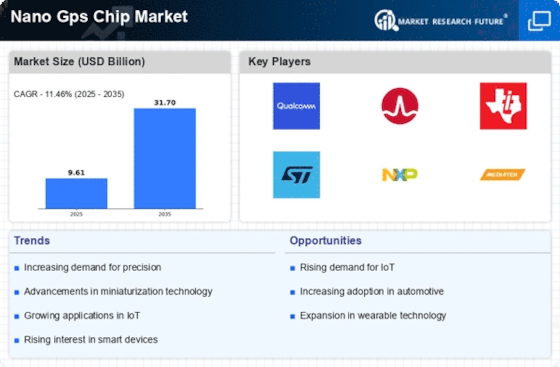Top Industry Leaders in the Nano Gps Chip Market

Competitive Landscape of the Nano GPS Chip Market:
The nano GPS chip market, still in its nascent stage, pulsates with immense potential fueled by the miniaturization demands of diverse industries. Players in this arena navigate a dynamic landscape characterized by established giants, nimble startups, and a constant influx of technological advancements. Understanding the competitive landscape is crucial for both established players seeking to retain market share and newcomers aiming to carve their niche.
Key Players
- OriginGPS Ltd.
- Shenzhen Esino Technology Ltd.
- Shenzhen Zhonghe Electronics Co., Ltd
- Dragon Bridge (SZ) Tech Co., Ltd
- VLSI Solution
- Analog Devices Inc.
- Fujitsu
- OLinkStar Co., Ltd.
- Unicore Communications, Inc.
- ATMEL Corporation
Strategies Adopted by Key Players:
Established players like Qualcomm, Broadcom, and Mediatek leverage their extensive experience, economies of scale, and brand recognition to maintain market dominance. Their strategies often revolve around:
- Vertical Integration: Controlling key aspects of the value chain, from chip design to manufacturing and testing, ensures quality control and cost optimization.
- Strategic Partnerships: Collaborations with complementary technology providers and end-use manufacturers accelerate innovation and market reach.
- Aggressive M&A Activity: Acquisitions of promising startups or smaller players with niche expertise bolster technological capabilities and market share.
Startups and emerging companies, on the other hand, adopt agility and innovation as their primary weapons. Their strategies may involve:
- Niche Specialization: Focusing on specific applications with differentiated solutions allows them to establish a foothold and compete against established players in defined segments.
- Cost-Effective Solutions: By targeting price-sensitive markets or offering lower power consumption chips, startups can attract cost-conscious customers.
- Open-Source Platforms: Leveraging open-source hardware and software platforms fosters community engagement and accelerates development cycles.
Market Share Analysis:
Determining market share in the nano GPS chip market requires a multi-faceted approach. Traditional metrics like revenue and unit shipments hold their ground, but additional factors add nuance to the picture. These include:
- Technology Portfolio: The breadth and depth of a company's technological offerings, encompassing aspects like accuracy, power consumption, and integration capabilities, play a significant role. Offering specialized solutions for niche applications can provide a competitive edge.
- Application Focus: Targeting specific end-use industries, such as wearables, drones, or asset tracking, allows for deeper market penetration and tailored solutions. Diversification across applications mitigates risks and opens new avenues for growth.
- Geographical Reach: Global presence through manufacturing facilities and distribution networks grants access to wider markets and fosters brand recognition. Local partnerships and customization can cater to regional demands.
- Intellectual Property: Possession of strong patent portfolios protects core technologies and creates barriers to entry for competitors. Active investment in research and development fuels innovation and sustains a competitive advantage.
New and Emerging Companies:
Several promising startups are actively carving their space in the nano GPS chip market. Some notable examples include:
- OriginGPS: Focusing on high-precision, low-power GPS solutions for wearables and IoT devices.
- Allystar Technology: Specializing in affordable GPS chips for asset tracking and logistics applications.
- Bluesky Silicon: Developing innovative multi-constellation GNSS chips for enhanced accuracy and global coverage.
These emerging players bring fresh perspectives and technological advancements, keeping established companies on their toes.
Industry Developments
OriginGPS Ltd.
- August 2023: Announced a strategic partnership with U-blox, a leading positioning technology provider, to integrate OriginGPS's nano-GPS technology into U-blox's modules for improved indoor and urban accuracy.
- May 2023: Unveiled the OG802, a next-generation nano-GPS chip with enhanced sensitivity and lower power consumption.
- March 2023: Received a US$10 million investment from a consortium of venture capitalists for further development and commercialization of its technology.
Shenzhen Esino Technology Ltd.
- October 2023: Exhibited its latest GNSS (Global Navigation Satellite System) modules incorporating nano-GPS technology at the Mobile World Congress in Barcelona.
- July 2023: Secured a large order from a Chinese smartphone manufacturer for its nano-GPS modules for next-generation wearables.
- April 2023: Filed multiple patent applications for its core nano-GPS technology, solidifying its intellectual property portfolio.









